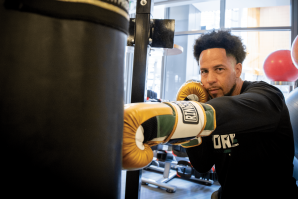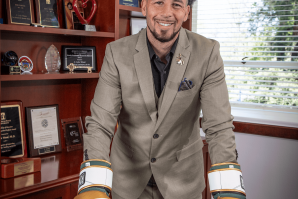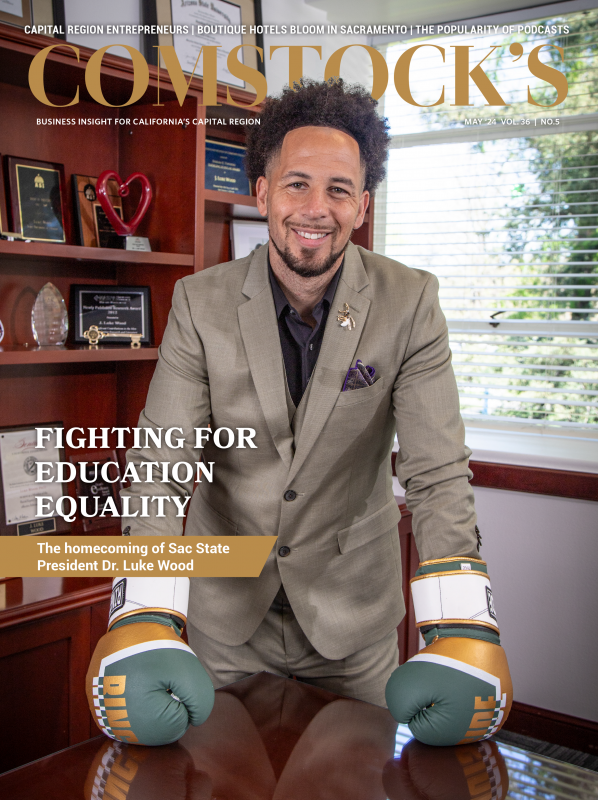The scars are still visible years later, like tiny threads around her collarbone. Shara Gabaldon, founder and CEO of Luxe Beauty and Body Co. in Sacramento, tilts her head up to show them more clearly one late spring morning.
“You can see these are my ECMO scars,” she says. “This is from my tracheotomy. And there’s a little scar here from my ventilator.”
In 2021, COVID had ravaged her body, and she ended up in a coma. She was told she had a 20 percent chance of living. Doctors hooked her up to an extracorporeal membrane oxygenation machine, similar to a heart-lung bypass machine, that pumped oxygenated blood into her while removing carbon dioxide. Life support was her only option to survive.
At the time, she had a full-time position at the Federal Emergency Management Agency. Her beauty business was something she did on the side. Gabaldon had never been an entrepreneur. But with her background in business and finance, she dove headfirst into the industry, specializing in noninvasive services like lip plumping and teeth whitening. By her second month in business, she says, she was bringing in $8,000-10,000 monthly. COVID came out of nowhere. Now, it’s been three years since Gabaldon woke up from that coma. Since then, all she has wanted is to reclaim the life she once had.
“You operate in an execution of fear or faith. And it has been a faithful journey for me since Day One. I had the audacity to think that I’m enough. I had the audacity to think, ‘Why not me?”Chris Johnson, CEO and founder, The Johnson Group
For many entrepreneurs, the past few years have served as something of a litmus test. From lockdowns and layoffs to a tumultuous economy, business owners have had to take a hard look at themselves and ask: How badly do I want to do this? But entrepreneurship runs on resiliency. The ability to adapt and endure despite unexpected setbacks can separate a business that thrives from one that crashes.
According to Janine Elliott, interim director of Venture Catalyst at UC Davis, resiliency is a muscle that needs to be built. Not everyone exercises it the same way. Some entrepreneurs persist by integrating new technology to upgrade their business models. Some, like the team at West Sacramento-based Origin Materials, adapt in the face of construction delays, supply chain issues and financial struggles. Others, like Gabaldon, find the fuel to persevere from their personal lives.
When she got out of the hospital in April 2021, she had to learn to walk and talk again. Her family helped her shower and eat. A survivor of domestic violence and crippling grief, she also lost her 22-year-old son, Jordan Drummer, who had been diagnosed with schizophrenia in 2021 and took his own life May 10, 2022. These days, Gabaldon no longer provides services and teaches them instead. Her clients are beauty service providers, who she mentors, coaches and educates, reminding them they have the same power to rise above hardship that she has.
“I’m just being me,” says Gabaldon, adding that she is on target to gross more than $2 million this year. “I’m not out here trying to pretend I’m something that I’m not. … I’m down to earth. I’m candid. I’m relatable. I am letting them know I’m nobody special. Even though I’m special. Right? You can be successful as well. I don’t think that I have something that nobody else has. They have the capability.”
Fear or faith
For Chris Johnson, it was his faith and fortitude that allowed him to exercise his resiliency muscle early on. He had been an entrepreneur since age 16 but didn’t know how to create a product. He researched every day on Google and connected with students at Chico State to build a prototype for his rapid ramen cooker. With his prototype, Johnson met with the store manager at Walmart in Natomas. It’s the “fastest, easiest way to cook ramen noodles,” Johnson told him. The manager grabbed a pack of ramen and led Johnson to the break room.
“He hands the noodles to me and says, ‘Show me,’” Johnson recalls. “So here I am, moment of truth, the biggest retailer in the world.”
Johnson put the ramen in the cooker and placed it in the microwave. After three awkward minutes, the microwave dinged.
“I take them out,” Johnson says, “and they’re not done. And I’m like, ‘Noooo!’ I am freaking out, I’m blowing my shot. Are you kidding me? I’ve done this hundreds of times.”
Johnson put the ramen in for another minute. But it still wasn’t done. He kept cool, stirred the noodles around. It looked like they were cooking, so he put the flavor packet in and handed it to the store manager.
“And he takes a bite,” Johnson recalls. “And he’s quiet. Then he said, ‘This is a winner. … We sell pallets and pallets of ramen noodles. I’ll be your first customer.’ He said, ‘I’ll buy 300 units.’ … And as I’m walking out he says, ‘Hey, make sure you pay for these ramen noodles on your way out.’”
After debuting on Shark Tank in 2012, his company Rapid Brands took off, touted as the fastest growing microwave cookware company in the world. He would eventually sell the company, but his employee talent acquisition company, The Johnson Group, is already achieving higher heights.
Last month, Johnson launched the company’s Passive Candidate. This platform, which he calls “LinkedIn on steroids,” leverages the power of AI to identify and connect with strong passive candidates for positions in architecture, engineering and construction companies. These candidates — who are employed but looking for new opportunities — are placed on the client’s calendar for interviews automatically. The Johnson Group will be industry agnostic, he says, launching to all professional industries in June.
“You operate in an execution of fear or faith,” he says. “And it has been a faithful journey for me since Day One. I had the audacity to think that I’m enough. I had the audacity to think, ‘Why not me?’”
‘You are not your startup’
According to Elliott of UC Davis, two big factors for resiliency are the ability to bounce back after setbacks and having a personal life and network of people you can lean on when things get hard. As Elliott will attest, trying new things also helps build that resiliency muscle, even if unrelated to the business.
“Sometimes taking a new route home, trying a new recipe, taking a dance or exercise class can do a lot for creating neuroplasticity,” she says. “To make your brain say it’s okay to not be good at something. Try it. That will build resiliency. It doesn’t only have to come from the school of hard knocks.”
While taking courses to earn her MBA from Dominican University of California, Elliott didn’t see herself as an entrepreneur or potential business owner. She thought it was too risky and didn’t relate to the images from Silicon Valley of what an entrepreneur was supposed to look and act like. But after graduating, she had the opportunity to be a co-founder of a cleantech company developing non-toxic, petroleum-free lubricants for industrial applications.
“The No. 1 thing I had to overcome was the feeling that I needed to ask permission,” Elliott says, “especially knowing if I made a mistake, the mistake was my own. … That took resilience-building to trust myself enough that even if I made a mistake, I was going to live and find a way to recover.”
The cleantech startup didn’t work out, which taught her, among other things, that resilience is a mix of staying humble and confident. You need the humility to ask for help but also the confidence that you can figure it out. The key to bouncing back, she says, is to recognize that failure is a failure of judgment or a mistake or some other function, not a personal flaw.
“The degree to which people can compartmentalize and not make every little foible an existential threat will serve entrepreneurs very well,” Elliott says. “That was something I had to learn on my own. I am not my startup. You are not your startup.”
Going for the gold
For John Bissell, the past few years have been “interesting,” he says. But as the co-CEO and co-founder of Origin Materials, tough times offer him the chance to regroup and reassess his approach.
John Bissell is CEO and co-founder of Origin Materials in West
Sacramento, which is touted as the world’s leading carbon
negative materials company.

Founded in 2008, Origin Materials, touted as the world’s leading carbon negative materials company, came onto the scene pioneering the production of chloromethylfurfural (CMF) and other sustainable intermediates to revolutionize a wide range of end products: plastics, clothing, textiles, packaging, fuels, toys and more.
In January 2023, the company announced the mechanical completion of its first plant, Origin 1. Its second plant was slated to be completed by mid-2025. But higher costs for labor, materials, inflation and interest rates pushed back the schedule to late 2026 or 2027. The stock price plummeted.
“Every week there was a new thing we had to figure out that nobody had seen before in terms of getting materials, getting labor,” Bissell says. “That was a pretty chaotic environment while building a first-of-its-kind plant.”
Origin Materials received revised cost estimates for the first phase of Origin 2 during the fourth quarter of 2023, reflecting these increases. To offset inflated project costs, the company is teaming up with other major companies to commercialize and scale its biomass conversion technology. These strategic partners would help pay for construction, making it less risky and cheaper.
With the first plant, Bissell says, the company “brute forced” its way through supply chain challenges to keep the project as on schedule as possible.
“We weren’t riding the wave,” he says. “We were fighting our way through the wave. One of the things we’ve realized coming out the other side is one, I don’t think we have the energy and capital to fight through with OM2 and two, if that’s the case, we really want to under-promise and over-deliver.”
According to Ryan Smith, chief technology officer and co-founder, fostering a culture that confronts hard truths became integral. Even though customer demand remains strong — noting more than $10 billion in agreements for its product and space — the company has had to adjust. In August 2023, the company officially announced the all-PET (polyethylene terephthalate) caps and closures business, a solution in a $65 billion market designed to make packaging more easily recycled, lighter and to help products stay fresh longer.
“It sounds mundane,” Bissell says, “but it’s actually incredibly cool material science that goes into making PET caps. It’s less obviously linked to our core chemical platform, even though it’s enabled by that platform. It feels like a side quest.” Regarding the response to this move, he continues: “Some say, ‘Gee, that’s genius, what a great way to generate cash and solve a real problem.’ But others say, ‘What are you doing? Why are you taking your eye off the ball?’”
In April, Origin announced a pivotal milestone at the Origin 1 plant in Sarnia, Ontario, Canada: converting the first batch of wood residues into sustainable intermediates (CMF, HTC, and oils and extractives). When it comes to resiliency, Bissell says, you have to ask yourself what you want to spend your life working on. He says he would always choose something important and difficult, something that makes him question if he wants to keep going. If it weren’t difficult and important, he says, somebody else would’ve done it already.
“If you want to go to the Olympics, you have to train really hard,” Bissell says. “If you’ve chosen to be a world class athlete, part of that is training unbelievably hard all the time without direct reward from doing that. That’s what we signed up for.”
Stay up to date on the latest in Capital Region business: Subscribe to the Comstock’s newsletter today.
Recommended For You

The Power of Podcasting
Podcasts have become a popular media option in the Capital Region
The anything-goes medium encompasses all kinds of local practitioners, from storytellers recording in their home offices to laughing exchanges recorded in band rehearsal rooms.

Giving Students a Fighting Chance With Combat U
When Dr. Luke Wood was finding his sea legs as Sac State’s new president, he walked over to Urijah Faber’s Ultimate Fitness gym on Folsom Boulevard, put on his boxing gloves and sparred with the gym owner. Then a light went off in Wood’s head. Since he was reinventing the university anyway, why not use the opportunity to partner with Faber in setting up a system so students could go to school for fighting?

The Bold Vision of Dr. Luke Wood
Sac State’s new, young president is creating an AI hub, Black honors program, college for foster youth and Combat U
Dr. Luke Wood has set his competitive sights on remaking his university into an institution that can compete academically, not just with other CSUs — he is clear in his ambition to make the beautiful, tree-filled and ethnically diverse campus the flagship university in the CSU system — but with the University of California campuses and other top-tier institutions around the country.

Giving Students a Fighting Chance With Combat U
When Dr. Luke Wood was finding his sea legs as Sac State’s new president, he walked over to Urijah Faber’s Ultimate Fitness gym on Folsom Boulevard, put on his boxing gloves and sparred with the gym owner. Then a light went off in Wood’s head. Since he was reinventing the university anyway, why not use the opportunity to partner with Faber in setting up a system so students could go to school for fighting?

History in Our Backyard
Past meets present in these quaint old towns that tourists are eager to explore
Auburn, Benicia, Folsom, Lodi and Truckee: five Northern California gems you’ll want to visit this summer.




